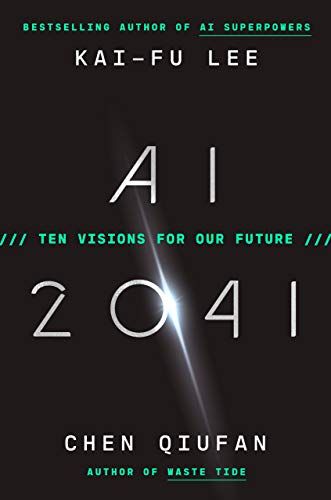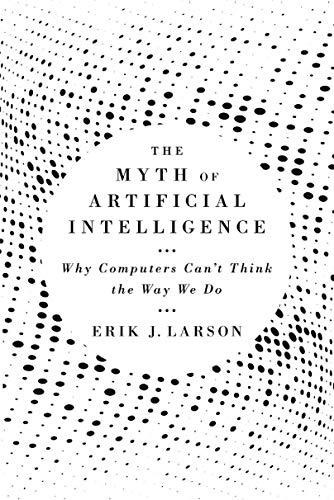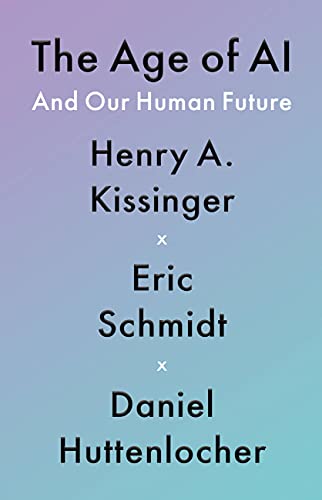Our automated future: The best books on AI that tell the truth about what's to come
Only one thing is for sure, we're not ready for what's next.

Like most people, I got my early education in artificial intelligence from movies. Dramatic films like A.I. (2001) or disaster flicks like Moonfall (2022) paint a less-than-favorable picture of humanity's future with AI.
But thankfully, there's much more to the technology than sentient robots and total warfare. Artificial intelligence is an important, evolving tool that is helping billions of people around the world live better. Yes, there are risks involved — but not necessarily the ones you might think.
Below is a list of the most trusted titles on AI so that you can begin to separate fact from fiction.
AI 2041
Robot-assisted surgeries have increased from 1.8 percent of all surgeries in 2012 to 15.1 percent in 2018. — Chen Qiufan
Technology dramatically changes the world every few hundred years. Think of transportation, the printing press, air travel, and nuclear power. All of these seemed impossible until they weren't.
In a similar way, AI will introduce many new ways of thinking about society.
- What will happen when most menial, repetitive jobs become automated?
- How cheap will transportation become when drivers are no longer needed?
- What role will robots play in everyday life?
The value of this book lies in the author's ability to carefully extrapolate what could be from what already is. You'll learn the basics of machine learning and deep learning and how they're laying the foundation for a different world.
Competing in the Age of AI
We are moving into an age powered by algorithms. — Marco Iansiti
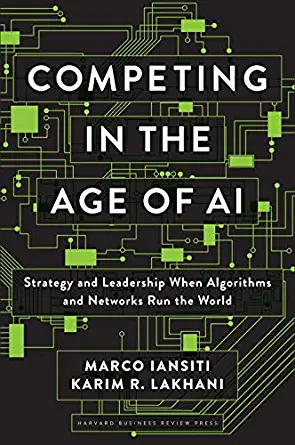
Competing in the Age of AI
Strategy and leadership when algorithms and networks run the world.
Artificial intelligence is really about data. As humans, we collect "data" through our senses and use that to make decisions about our world. AI tools rely on their own set of digital senses: every time we use a website, fill out a form, or take an action that can be quantified we are supplying them with information.
Iansiti and Lakhani's book translates these technological advances into the business world. The text presents a number of high-level strategies executives should consider when planning for their company's future. The more data you can collect from your customers (with permission), the more significant your competitive advantage will be in the long term.
The Myth of Artificial Intelligence
Proponents of AI have huge incentives to minimize its known limitations. — Erik Larson
Personally, I always like to hear more than one side of the story. When it comes to artificial intelligence, most of the reporting revolves around its supposed power; either for good or evil. But what if that assumption itself is wrong? What if AI, in reality, won't really change that much at all?
Renowned author and journalist Erik J. Larson dove into this debate and found some interesting details. As mentioned above, AI relies on data. But this limits its creativity since all of its outputs are the result of inductive thinking. Humans are much more varied and inventive in how they think: pulling in unrelated sources, jumping to assumptions, and consciously or unconsciously sifting through infinite variables.
The AI we have now cannot think like humans. Yes, they will be able to replicate some of our simplest tasks. But most of the fears we have about AI are due to misunderstanding its capabilities.
The Age of AI
AI is not an industry. It is an enabler. — Henry Kissinger
Our next book moves back into the positive light and focuses on the tremendous opportunities artificial intelligence is already creating in the world. The text was put together by three highly influential names: Eric Schmidt of Google, former Secretary of State Henry A. Kissinger, and Daniel Huttenlocher the dean of MIT's College of Computing.
Much like our first recommendation, you'll find a collection of examples that highlight where our world is headed and why this technology is so essential to that future. What I liked more about this book was its forays into decidedly non-technical topics, such as how philosophy informed AI's development and why politics will play a major role in its release.
Although the book can be a bit dense in parts, this is quickly becoming the definitive guide on AI for thought leaders.
The Business Case for AI
AI can be a great tool to automate repetitive and time-consuming work where human-level decision-making is involved. ― Kavita Ganesan
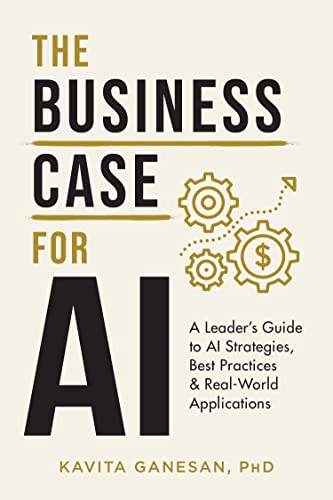
The Business Case for AI
A leader's guide to artificial intelligence strategies, best practices, and real-world applications.
Last but certainly not least is the most practical book on our list. Dr. Kavita Ganesan is a leader in the artificial intelligence space with over 15 years of experience helping mid-to-large cap companies implement strategic initiatives.
Ganesan understands the AI has almost fallen into the trap of becoming another marketing-keyword, rather than an integrated business tool. When used properly, this technology saves immense amounts of time and money for any business. The trick is to know exactly what results you're after.
If you're in a position of authority in a large company or a consultant in an adjacent industry, you'll likely find this title highly valuable (not to mention refreshingly readable). For small business owners and solopreneurs, you'll find fewer tactical takeaways but still develop an understanding of how you may want to adjust your strategy going forward.
An uncertain future
Nothing is written in stone when it comes to our future. AI is here to stay, and although it's developing quickly, the truth is there will always be limitations to what it can do and to the extent it'll be applied in the real world.
The best thing to do now is to get informed. Learn what to look for and how to position yourself for success in an increasingly automated world. Remember, opportunity doesn't disappear, it just changes shape.

